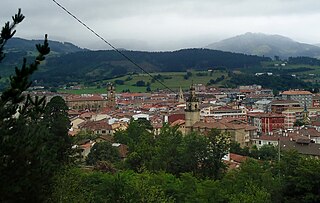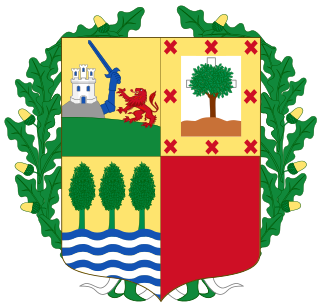
Vitoria-Gasteiz is the seat of government and the capital city of the Basque Country and of the province of Álava in northern Spain. It holds the autonomous community's House of Parliament, the headquarters of the Government, and the Lehendakari's official residency. The municipality—which comprises not only the city but also the mainly agricultural lands of 63 villages around—is the largest in the Basque Country, with a total area of 276.81 square kilometres (106.88 sq mi), and it has a population of 253,093. The dwellers of Vitoria-Gasteiz are called vitorianos or gasteiztarrak, while traditionally they are dubbed babazorros.

The Basque Nationalist Party, officially Basque National Party in English, is a Basque nationalist and regionalist political party. The party is located in the centre of the political spectrum.

Euskotren Tranbia is the brand under which the tramway networks in the cities of Vitoria-Gasteiz and Bilbao are run. The system in Bilbao started operations in 2002, and the one in Vitoria-Gasteiz in 2008. It is one of the four commercial divisions under which Euskotren operates. The infrastructure is owned by the public entity Euskal Trenbide Sarea and tracks use 1,000 mm narrow gauge.

The Basque Country is the name given to the home of the Basque people. The Basque Country is located in the western Pyrenees, straddling the border between France and Spain on the coast of the Bay of Biscay.

Durango is a town and municipality of the historical territory and province of Biscay, located in the Basque Country, Spain. It is the main town of Durangaldea, one of the comarcas of Biscay. Because of its economical activities and population, Durango is considered one of the largest towns in Biscay after the ones that compose the conurbation of Greater Bilbao.

The proposed 2008 referendum was a poll intended to occur in the Basque Country in that year, but prevented by the Supreme Court of Spain at the instigation of the Spanish Government.

Basque Y is the high-speed rail network being built between the three cities of the Basque Autonomous Community, in Spain; Bilbao, Vitoria-Gasteiz and Donostia-San Sebastián.

The Basque Country, also called the Basque Autonomous Community, is an autonomous community in northern Spain. It includes the Basque provinces of Álava, Biscay, and Gipuzkoa. It also surrounds an enclave called Treviño, which belongs to the neighboring autonomous community of Castile and León.
The following is a timeline of the history of the city of Bilbao in the Biscay province of Spain.

Errekaleor is a neighbourhood on the periphery of Vitoria-Gasteiz, in the Basque Country, Spain. It sits on the plateau created by the Errekaleor river, which is part of the Green Belt of Vitoria-Gasteiz. From 2013 onwards, the area was occupied by squatters and became known as Errekaleor Bizirik. The project is based on the principles of workers' self-management, consensus based decision making, feminism, anti-capitalism and Basque cultural re-invigoration. The neighbourhood is the largest occupied space of its type on the Iberian Peninsula, with over 10 hectares of land and 150 inhabitants. Residents include children, the elderly, blue-collar workers, the unemployed, students, and teachers. The project includes an organic farm of 2 hectares, a bakery, a bar, a social centre, a library, a theatre, a free shop, a recording studio, and other projects.
Events in the year 2018 in Spain.

Coalition for a Solidary Europe is an electoral list of regionalist parties that was formed to contest the 2019 and 2024 European Parliament election in Spain. The list is the de facto successor of the Coalition for Europe that ran in the 2014 and 2009 elections. Is formed by the Basque Nationalist Party (EAJ/PNV), Canarian Coalition–Canarian Nationalist Party (CCa–PNC), Proposal for the Isles, Geroa Socialverdes and Atarrabia Taldea.
In the run up to the 2019 Spanish local elections, various organisations carried out opinion polling to gauge voting intention in local entities in Spain. Results of such polls for municipalities and the three foral deputations in the Basque Country are displayed in this article. The date range for these opinion polls is from the previous local elections, held on 24 May 2015, to the day the next elections were held, on 26 May 2019.
In the run up to the 2015 Spanish local elections, various organisations carried out opinion polling to gauge voting intention in local entities in Spain. Results of such polls for municipalities and the three foral deputations in the Basque Country are displayed in this article. The date range for these opinion polls is from the previous local elections, held on 22 May 2011, to the day the next elections were held, on 24 May 2015.
In the run up to the 2023 Spanish local elections, various organisations carry out opinion polling to gauge voting intention in local entities in Spain. Results of such polls for municipalities and the three foral deputations in the Basque Country are displayed in this article. The date range for these opinion polls is from the previous local elections, held on 26 May 2019, to the day the next elections were held, on 28 May 2023.

Gorka Urtaran Agirre is a Spanish politician of the Basque Nationalist Party (EAJ-PNV). He served as mayor of Vitoria-Gasteiz from 2015 to 2023.

Basque independence is the principle and a movement for autonomy or self government for the Basque Country, independent of the Government of Spain and the Government of France.

Imanol Pradales Gil is a Basque politician and sociologist from Spain, member of the Basque Nationalist Party (EAJ-PNV). After leading his party in the 2024 regional election, he became the next Lehendakari.

Podemos Euskadi-Ahal Dugu Euskadi is a left-wing to far-left political party in the Basque Autonomous Community in Spain. It is the Basque federation of the Spanish state-level political party Podemos.














